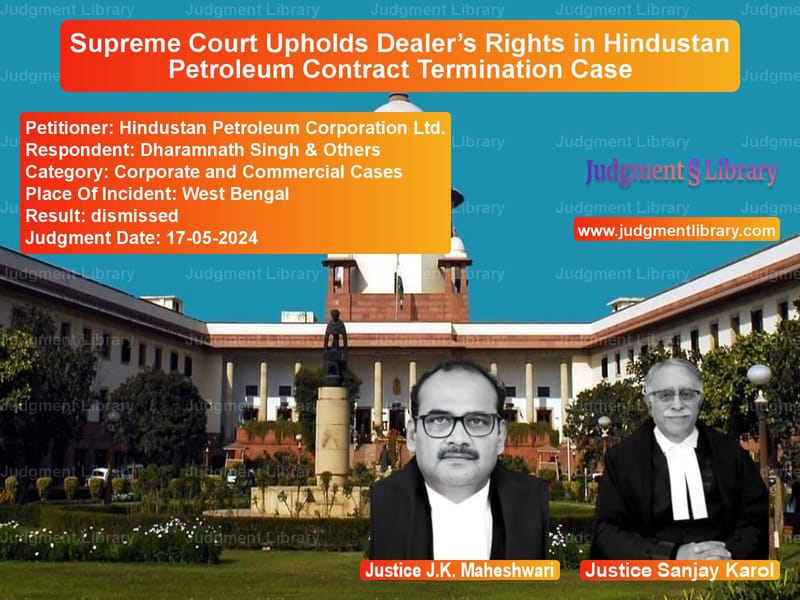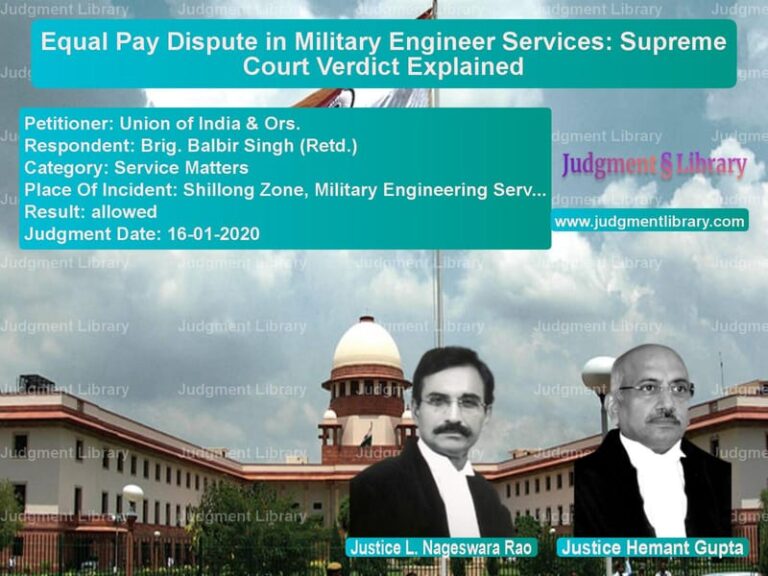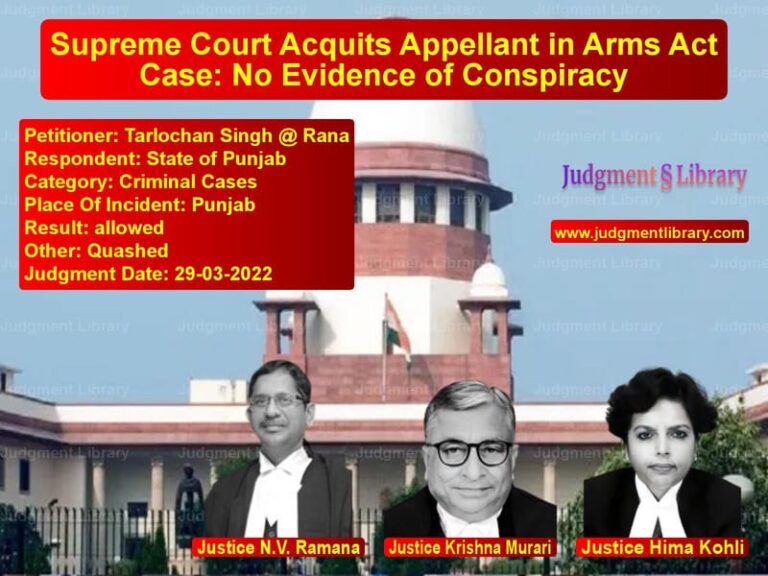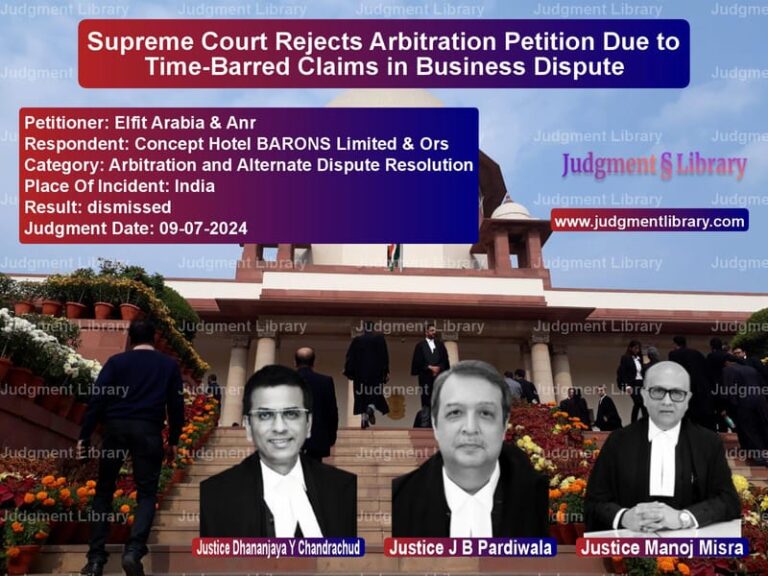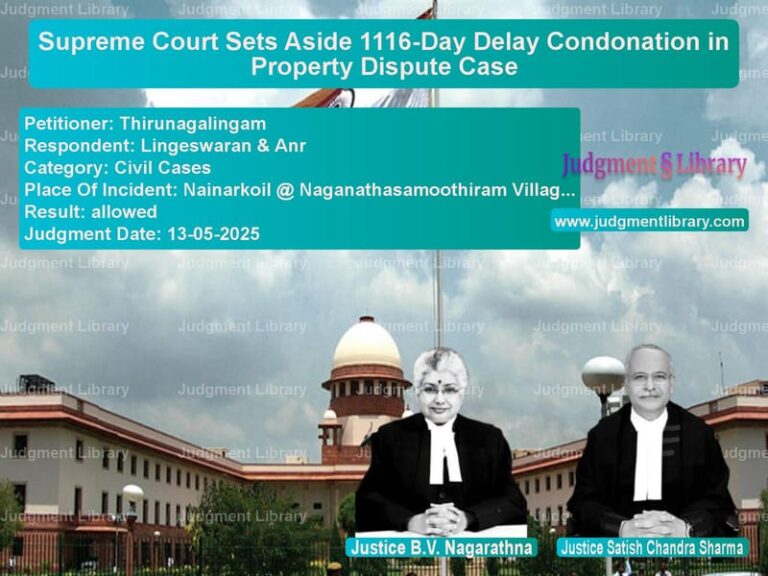Supreme Court Upholds Dealer’s Rights in Hindustan Petroleum Contract Termination Case
The case of Hindustan Petroleum Corporation Ltd. vs. Dharamnath Singh & Others is a landmark judgment by the Supreme Court of India concerning the contractual rights of petroleum dealers and procedural compliance in terminating dealership agreements. The ruling underscores the necessity for oil companies to strictly adhere to legal procedures and guidelines while taking punitive actions against their dealers.
Background of the Case
The respondent, Dharamnath Singh, was appointed as a dealer for petroleum products by Hindustan Petroleum Corporation Ltd. (HPCL) through a dealership agreement dated February 1, 1997. In August 2007, SGS India, an agency purportedly appointed by HPCL, conducted tests at the respondent’s petrol pump and alleged irregularities in the quality of High-Speed Diesel (HSD) and Motor Spirit (MS). HPCL subsequently issued a show cause notice and suspended the dealership based on the test results.
Aggrieved by this decision, the respondent challenged the suspension order in the High Court, arguing that the sampling process was illegal. The High Court quashed HPCL’s decision, ruling that the dealership termination violated statutory guidelines and principles of natural justice. HPCL then appealed to the Supreme Court.
Key Legal Issues Considered
- Whether HPCL’s actions in suspending and terminating the dealership adhered to legal and contractual obligations.
- Whether SGS India, an external agency, had the authority to collect fuel samples.
- Whether HPCL’s reliance on SGS India’s test results justified termination under the dealership agreement.
- Whether procedural violations in sample collection rendered the action unlawful.
Arguments by the Appellant (HPCL)
HPCL contended that:
- The dealership agreement provided for immediate termination upon breach of specific clauses.
- Independent test results confirmed the presence of adulteration in the fuel.
- The Marketing Discipline Guidelines (MDG) permitted external agencies like SGS India to conduct quality tests.
- The dealership was terminated based on contractual breaches, not regulatory violations.
Arguments by the Respondent (Dharamnath Singh)
The respondent countered:
- The fuel sampling process was conducted in violation of the Petroleum Control Order, 2005.
- SGS India lacked legal authority to collect and analyze samples.
- The suspension and termination orders were arbitrary and did not follow due process.
- HPCL’s actions were against established principles of natural justice.
Supreme Court’s Analysis and Findings
The Supreme Court meticulously analyzed whether HPCL had followed the correct procedures before terminating the dealership.
1. Legality of Sample Collection by SGS India
The Court ruled that:
- Under Clause 7 of the Control Order, only government-appointed officers and specific oil company officials were authorized to collect fuel samples.
- HPCL’s delegation of sample collection to SGS India violated statutory provisions.
- The improper sampling process tainted the entire proceedings against the respondent.
2. Procedural Violations in Termination
The Court found that:
- HPCL did not serve the respondent adequate notice before termination.
- The dealership agreement did not permit termination based solely on externally conducted tests.
- The failure to adhere to procedural guidelines invalidated HPCL’s actions.
3. Importance of Natural Justice
The Supreme Court emphasized that any punitive action affecting livelihood must follow due process:
- Dealers must be given a fair opportunity to respond before termination.
- Procedural lapses cannot be justified by claims of contractual authority.
- Oil companies must ensure compliance with statutory requirements before penalizing dealers.
Final Ruling
The Supreme Court upheld the High Court’s decision, stating:
“The termination of the respondent’s dealership, based on an unauthorized sample collection process, is legally unsustainable. The procedural irregularities render the action arbitrary and violative of principles of natural justice.”
Accordingly, HPCL’s appeal was dismissed, and the respondent’s dealership rights were restored.
Implications of the Judgment
- Strengthening Dealer Protections: Ensures oil companies cannot arbitrarily terminate dealerships without legal compliance.
- Clarifying Regulatory Compliance: Reinforces that sample collection must adhere to statutory guidelines.
- Upholding Natural Justice: Establishes that due process must be followed in contractual disputes.
Conclusion
This ruling by the Supreme Court reinforces the principle that procedural fairness must be upheld in contractual terminations. By affirming the respondent’s rights, the Court has set a precedent ensuring that corporations adhere strictly to legal frameworks while dealing with dealership disputes.
Petitioner Name: Hindustan Petroleum Corporation Ltd..Respondent Name: Dharamnath Singh & Others.Judgment By: Justice J.K. Maheshwari, Justice Sanjay Karol.Place Of Incident: West Bengal.Judgment Date: 17-05-2024.
Don’t miss out on the full details! Download the complete judgment in PDF format below and gain valuable insights instantly!
Download Judgment: hindustan-petroleum-vs-dharamnath-singh-&-o-supreme-court-of-india-judgment-dated-17-05-2024.pdf
Directly Download Judgment: Directly download this Judgment
See all petitions in Contract Disputes
See all petitions in Corporate Compliance
See all petitions in unfair trade practices
See all petitions in Judgment by J.K. Maheshwari
See all petitions in Judgment by Sanjay Karol
See all petitions in dismissed
See all petitions in supreme court of India judgments May 2024
See all petitions in 2024 judgments
See all posts in Corporate and Commercial Cases Category
See all allowed petitions in Corporate and Commercial Cases Category
See all Dismissed petitions in Corporate and Commercial Cases Category
See all partially allowed petitions in Corporate and Commercial Cases Category

